
Molotov is a Mexican rock band formed in Mexico City in 1995. Their lyrics, which are rapped and sung by all members of the group, feature a mixture of Spanish and English. The band members also switch instruments and roles depending on what song they are performing.

Intocable is an American band from Zapata, Texas that plays regional Mexican music; specializing in norteño and tejano music. It was started by friends Ricardo Javier Muñoz and René Orlando Martínez in the early 1990s. In a few years, Intocable fused the genres Tejano and Norteño with a musical signature that fused Tejano's robust conjunto and Norteño folk rhythms with a pop balladry. Intocable is perhaps the most influential group in Tejano and their tough Tejano/Norteño fusion has become the blueprint for several Tejano bands. The group's style combines romantic, hooky melodies, tight instrumentation and vocal harmony.

The 4th Annual Latin Grammy Awards were held in Miami at the American Airlines Arena on Wednesday, September 3, 2003. It was the first time the telecast was held outside of Los Angeles. Juanes was the night's biggest winner winning a record five awards including Album of the Year. He tied his own record winning five awards again five years later in 2008. Juan Luis Guerra and Calle 13 also tied this record in 2007 and 2009 respectively.

The 5th Annual Latin Grammy Awards were held on Wednesday, September 1, 2004, at the Shrine Auditorium in Los Angeles.

José Martín Cuevas Cobos, known by his stage name Pedro Fernández, is a Mexican singer, songwriter, actor, and television host. Fernández began his international career as Pedrito Fernández at the age of seven.

Dance and Dense Denso is a third studio album by Mexican band Molotov, released on February 25, 2003, through Universal Music Latino. It was produced by Argentine musician Gustavo Santaolalla.
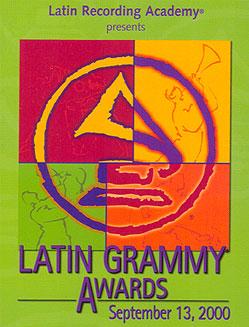
The 1st Annual Latin Grammy Awards were held in Los Angeles at the Staples Center on Wednesday, September 13, 2000. The big winners were Luis Miguel, Santana and Maná with 3 awards; Juan Luis Guerra, Shakira, Fito Páez and Emilio Estefan Jr. received 2 awards each.
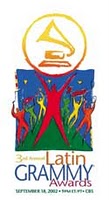
The 3rd Annual Latin Grammy Awards were held in Los Angeles at the Kodak Theatre on Wednesday, September 18, 2002. Alejandro Sanz was the night's big winner, winning a total of three awards including Album of the Year. The ceremony returned in style after the 2001 ceremony was cancelled because of the September 11, 2001 terrorist attacks across America, and all presenters apologized to viewers during the broadcast for such.

The 9th Annual Latin Grammy Awards took place on Thursday, November 13, 2008, at the Toyota Center in Houston, Texas and were aired on Univision. The Brazilian Field awards were presented on the same day at the Ibirapuera Auditorium in São Paulo. The Latin Recording Academy Person of the Year was Gloria Estefan. Juanes was the night's big winner, winning 5 awards including Album of the Year. He now has 17 Latin Grammy awards which is more than any other recording artist. The show was watched by an average of 5.8 millions.
La Fiebre is a Tejano music band from Pasadena, Texas.
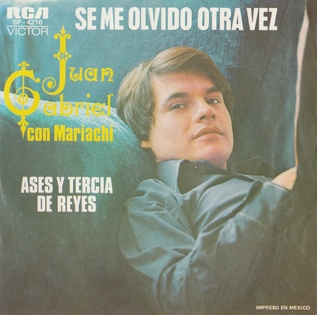
"Se Me Olvidó Otra Vez" is a song written and performed by Mexican singer-songwriter Juan Gabriel for his fourth studio album, Juan Gabriel con el Mariachi Vargas de Tecalitlán (1974). The song is a ranchera number that tells of an impossible reunion as the singer forgets he is the only one who loved a woman. It was released as the lead single from the album in 1975. The song has been listed as among Juan Gabriel's best songs according to music critics and was one of the best-performing singles of 1975 in Mexico. Gabriel has re-recorded the song twice, the first for his compilation album, Por Los Siglos (2001), and as a duet with fellow Mexican singer-songwriter Marco Antonio Solís on his 28th studio album, Los Dúo (2015).

The 11th Annual Latin Grammy Awards were held on Thursday, November 11, 2010, at the Mandalay Bay Events Center in Las Vegas, Nevada. It was the third time the annual event had taken place at this location. The eligibility period for recordings to be nominated was July 1, 2009 to June 30, 2010. Nominations were announced on September 8, 2010. On September 14, 2010, it was announced that the Latin Recording Academy Person of the Year honoree would be Plácido Domingo. The big winners of the night were Camila, Juan Luis Guerra and Gustavo Cerati with three awards.
"Hasta Que Te Conocí" is a song by Mexican singer-songwriter Juan Gabriel. It was released in 1986 as the third single from his studio album Pensamientos. Written and produced by Gabriel, the song's lyrics focus on a protagonist learning the meaning of suffering after meeting a lover who mistreats him. It peaked at number two on the Billboard Hot Latin Song chart. A live version of the song was included on his album En el Palacio de Bellas Artes (1990) which peaked at number ten on the Hot Latin Songs chart.

Carla Patricia Morrison Flores is a Mexican indie-pop guitarist and singer. She has released three studio albums and has received various awards and nominations including two Grammy Award nominations and three Latin Grammy Awards.

The 13th Annual Latin Grammy Awards was held on Thursday, November 15, 2012 at the Mandalay Bay Events Center in Las Vegas, Nevada. It was the fifth time the awards was held at this venue and in Las Vegas. It also marks the last year in the Latin Recording Academy's contract where the Mandalay Bay Events Center hosted. It is unknown if the awards will continue to be held at this location beyond 2012.
Dirty Karma is an indie rock band from Mexico City, Mexico.

The 14th Annual Latin Grammy Awards was held on Thursday, November 21, 2013, at the Mandalay Bay Events Center in Las Vegas. This was the sixth time that Latin Grammys has been held at this location. The main telecast was broadcast on Univision at 8:00 PM EST.
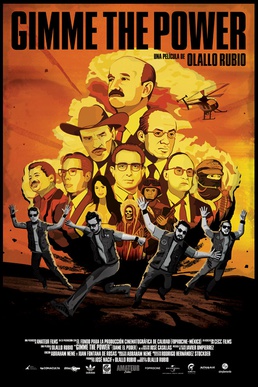
Gimme the Power is a 2012 Mexican documentary film by Olallo Rubio about the band Molotov.
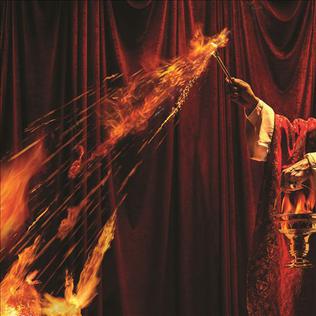
Agua Maldita is Molotov's seventh album, which was released June 10, 2014. It is the first band's studio album since Eternamiente, released in 2007. At the Latin Grammy Awards of 2014, the album won the award for Best Rock Album.
This article includes an overview of the major events and trends in Latin music in the 1970s, namely in Ibero-America. This includes recordings, festivals, award ceremonies, births and deaths of Latin music artists, and the advancement and adjournment of the genre from 1970 to 1979.
















